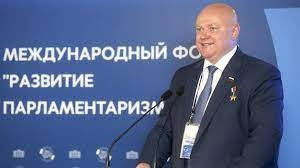On July 26, 2021, US President Joe Biden announced the end of the US combat role in Iraq “Our role in Iraq will be…to be available to continue to train, to assist to help and to deal with ISIS as it arises, but we are not going to be by the end of the year in a combat mission,” Biden said at the beginning of his meeting with Iraqi Prime Minister Mustafa Al-Kadhimi.
General John Hyten, Vice Chairman of the Joint Chiefs of Staff supplied the strategic justification for the Iraq decision, claiming that the US had concentrated for a long time on the Middle East, but now it had to concentrate on other threats. “But I can tell you that the primary risk to this nation, long-term risk, is China…Maybe the nearer-term risk is Russia. And we have to make sure that we focus our attention on those. So that means, and you’ve seen it in Afghanistan and you’re seeing it play out now in Iraq — and I’m not gonna make any announcements today, because that’s the job of the folks across the river to make those announcements. But what you can see is, understanding that we have to not ignore the threats in the Middle East, but deal with the threat to the Middle East in a different way, with a smaller footprint, so we can divert more of our body to threats in China and Russia.”[1]
Both the Biden withdrawal announcement and Hyten’s rationale behind it drew comment in Russia. Russian officials tended to portray Biden’s announcement coming on the heels of the American withdrawal from Afghanistan as proof that the United States was a superpower in retreat, after having made a mess of things everywhere it intervened. Naturally, the rationale supplied by Hyten of withdrawing troops for the purpose of concentrating them against Russia was bound to provoke the ire of Russian officialdom.
Nevertheless, Russian experts dismissed the importance of the Iraq announcement. First, it had been a long time coming, and was delayed only by the appearance of ISIS. Secondly, the US military would remain in an advisory capacity in Iraq. Third, Iraq was a totally different story than Afghanistan. There was no Iraqi equivalent to the Taliban. Hyten’s justification for the withdrawal was seen as political window dressing designed to blunt criticism of the withdrawal. Even if all the troops extracted from Iraq were repositioned closer to Russia, considering that the American contingent numbered only about 2000 troops, it would hardly be a game changer.
A survey of reactions to the Biden announcement follows below:
Foreign Ministry Spokesperson Zakharova: The US Should Remove Its Footprints Everywhere
Foreign Ministry Spokesperson Maria Zakharova commented derisively on General John Hyten’s explanation about reorienting the body of American military forces. “Maybe, prior to reorienting the body to confront [new] threats, the US should ‘remove its footprints’ in Iraq, Libya, Afghanistan and Syria.[2]
The pro Kremlin tv presenter Vladimir Solovyov tweeted. So, the U.S. is going to wage a full-scale war with us and China, and so it’s withdrawing troops from Afghanistan and Iraq? And where does it lead? Closer to our borders.[3]
Pushkov: The US Is ‘A Superpower In Retreat’
Senator Alexey Pushkov Chairman of the Federation Council Commission on Information Policy and Cooperation with the Media, claimed that US President Joe Biden was emulating his predecessor Donald Trump in seeking to downsize the American military presence in the Middle East. First came Afghanistan, and now, Iraq.
“The administrations are different, but the logic remains the same: the US cannot cope with a military presence in several countries of the world at once,” wrote Pushkov in his Telegram channel. Pushkov labeled the US today as a “superpower in retreat.”[4]
Andrei Krasov, a member of the Duma Defense Committee also compared the two withdrawals.
“The US is leaving Iraq, just like it is leaving Afghanistan. In fact, this is an admission of its powerlessness and the failure of the mission to bring ‘American-style peace’ to these lands.” –
According to Krasov, during the presence of American troops in Iraq and Afghanistan, Washington destroyed local administrative systems. At the same time, the new systems that were created with the help of the United States are incapable of independently combating the threat of terrorism.[5]
While pleased with America’s discomfiture, Krasov noted that the withdrawal also poses a problem for Russia: ” It is likely that groups that have raised the flag of terrorism, will once again gain strength in the region and will involve unemployed youth in their ranks. Russia, of course, is worried about the possible strengthening of radical groups in this region after the departure of the US military.[6]

In contrast to Krasov, Yuri Shvytkin, Deputy Chairman of the State Duma Defense Committee, claimed that Russia did not need to pour new forces into the region due to the American withdrawal. Russia had deployed enough troops and had sufficient means in Syria should an uptick in regional terrorist activity occur.
Shvytkin was also wary of predicting the consequences of the American troop withdrawal from Iraq, because he was not certain that this was a genuine withdrawal and cited the Syrian precedent. Despite the official withdrawal of American troops from Syria, the Americans are still deployed there and were abetting the terrorists.[7]
Konstantin Truevtsev: A Strategic American Failure
Konstantin Truevtsev, a head researcher at the Russian Academy of Sciences’ Institute of Oriental Studies, claimed that the main success of the American military mission in Iraq was the operation to overthrow Saddam Hussein, but after that, everything went downhill and the Americans failed in their attempts to maintain control.
Truevstev claimed that the United States failed to replace Saddam’s army with a new armed force in Iraq. The US erred by its wholesale purge of many high-ranking Iraqi officers due to their membership of Saddam Hussein’s Baath party. Many of them joined ISIS. “We can definitely say that this is a strategic failure”, opined Truevstev.
Another American failure claimed Truevstev was its inability to curb the growing Iranian influence in Iraq and Tehran controlled the situation inside Iraq to a greater extent.
“In total, all these factors determined the need to accelerate the US withdrawal from Iraq, because it is absolutely certain that the United States, as they say, has no fish to catch in Iraq in terms of political and military domination.” Paradoxically, Truevstev believes that Iran will not necessarily benefit from and American withdrawal. Iraq is becoming increasingly independent of Iran, therefore, the growth of Tehran’s influence after the withdrawal of the United States should not be expected.[8]

Russian Experts: Biden Announcement Is No Big Deal
In contrast to the tendency of Russian officials to make capital out of the American withdrawal, Russian experts were much more restrained in their reactions. Boris Dolgov, a Senior Research Fellow at the Russian Academy of Sciences’ Center for Arab and Islamic Studies, minimized the importance of the US troop withdrawal from Iraq and predicted that it would not aggravate the situation in the region.
“This is not news, because this issue has long been on the American political establishment’s agenda. I believe that the withdrawal of US contingent from Iraq isn’t a radical step that will change the situation in the region. In my opinion no changes in the region are to be expected owing to this withdrawal”[9]
The noted international affairs commentator Fyodor Lukyanov, emphasized the difference between Iraq and Afghanistan:
“In Baghdad, the current regime is holding on quite firmly. Therefore, the presence of American troops there is a rather significant factor, but far from a decisive one “
This was in marked contrast to Afghanistan. “Of course, Iraq also has a lot of problems and its own conflict dynamics, but the solution of these problems is not so rigidly tied to the foreign military presence, in contrast to Kabul.”
According to Lukyanov, the Iraqi leadership is well aware that “the United States still remains a significant factor in ensuring stability in the Middle East even now, when it is trying to minimize its presence…Washington is not interested in everything collapsing after they leave the region,”
“Moreover, despite the fact that ISIS… as a structure, has been defeated as a whole, the preconditions for its recovery, as well as the people who previously joined the group, are still out there. Therefore, if things go badly in Iraq, the conflict could take a new turn, Lukyanov warned.
Still, the threat of an ISIS resurgence was not comparable to Afghanistan: “Unlike Afghanistan, in Iraq there is no powerful movement similar to the Taliban…and it is unlikely to appear in the future.”
Lukyanov took Hyten’s explanation that the withdrawn troops were headed for Russia’s borders or to South East Asia with a grain of salt. “There is absolutely no need to do this. The statements that the American presence in Iraq will be reduced in order to ‘focus more on the threats emanating from China and Russia’ is an attempt to create some kind of political motivation” designed to parry critics who talk of an American surrender.
“So, throwing off the burden of the previous era is Biden’s clear and conscious course…, But, since such a ‘packaging’ casts a shadow on the new administration, an attempt is made to present it in the form of a new strategy. Therefore, the American leadership is changing the subject to ‘more important threats’, called China and Russia. But this is just an element of political propaganda that does not warrant such close attention.”[10]

Kirill Semyonov, an expert at the Russian International Affairs Council (RIAC), noted that contrary to the impression that Biden wanted to create, the United States was not going to withdraw its troops from Iraq. Washington would maintain its presence in Iraq as long as ISIS remained in the region.” This prospect was salutary for Russia, because the US presence actually served Russia’s interests.[11]
Middle East Expert Shumilin: The Timing Was Right For An American Withdrawal
In a lengthy interview with Rosbalt media, Middle East expert Alexander Shumilin, who specializes in US policy in the region, and doubles as the chief researcher of the Russian Academy of Sciences’ Institute of Europe also subscribed to the opinion that the Biden announcement would have few far-reaching consequences.
Asked about the Hyten explanation for the announcement, Shumilin described this as old news.
“It should be recalled here that the United States began to declare the inevitable withdrawal of its troops from Iraq during the presidency of George W. Bush, who brought them there in 2003. The consensus that existed in American society and in Congress in 2001, when the American military was sent to Afghanistan, was gone two years later. This action then provoked the already well-known split between Washington and its allies, with Russia taking a neutral position on this issue.
“By the end of Bush Jr.’s second term, the White House announced the inevitability of a withdrawal of troops from Iraq in the very foreseeable future. This thesis was also supported by Bush Jr.’s successor, Barack Obama (albeit without any specific schedules, but the position was unambiguous). The next American president, Donald Trump, agreed with this position. However, given the changed conditions in the region – i.e. the Syrian crisis, and the emergence of the ‘Islamic State’ (a terrorist organization banned in Russia), and its attack on Iraq, these plans were postponed for an indefinite future. At that time, no one could talk about the specific timing of the American military withdrawal.” Now, conditions were more favorable.
As far as Hyten tying the withdrawal of American troops from Afghanistan and Iraq to the threats emanating from Russia and China, Shumilin responded that “over the past few years, Russia has been officially viewed by Washington as an adversary, as a threat somewhat inferior to that of China, but on a par with it and Iran.” Shumilin did not take the redeployment too seriously:
“How the withdrawal of the small American military (about two thousand people) from Iraq will help strengthen them in the Russian or, more precisely, the anti-Russian direction – this is already a matter for the military.”
Shumilin was asked whether the American withdrawal put Iraq at the mercy of Iran and responded: “I would say that this is a strong exaggeration. Of course, there are Iranians in Iraq, but they do not predominate there and are not very influential. Moreover, even the Iraqi Shi’ites are not ready to interact with Iran in everything. Of course, after the Americans leave, Baghdad will become closer to Tehran, the Iraqi government will be forced to maneuver, relying on the support of the forces of the Western coalition, the minimum international contingent that will remain there as consultants, and so on. Iran’s influence in Iraq, of course, will increase, but not totally.
“Incidentally, I do not think that the American contingent that has been in Iraq so far has had a strong impact on limiting Tehran’s capabilities in that country.”
Finally, Shumilin was asked for a prediction about how the Iraqi withdrawal would impact on the US military contingent in northeastern Syria. If these forces were withdrawn, would the territories come under Bashar Assad’s control? He replied:
” Not really. The military-political thought in Washington in relation to Syria is developing in such a way that, on the one hand, they would like to prevent the defeat of the Kurdish forces by the Turks, and on the other, try to achieve a certain balance between the Kurds and Turkish President Recep Erdogan, as well as transfer the dominant role in northern Syria to Turkey.”
Therefore, since Biden was intent on patching things up with Erdogan it was more likely that Turkey would move in upon an American withdrawal.
“We see how Biden is trying to improve relations with Erdogan, overcome the obstacles that existed between Turkey and the United States, and rely on Ankara as the dominant force in northern Syria. But there is no talk of a complete withdrawal of American troops from here, as, by the way, from Iraq.”[12]

 Eurasia Press & News
Eurasia Press & News


